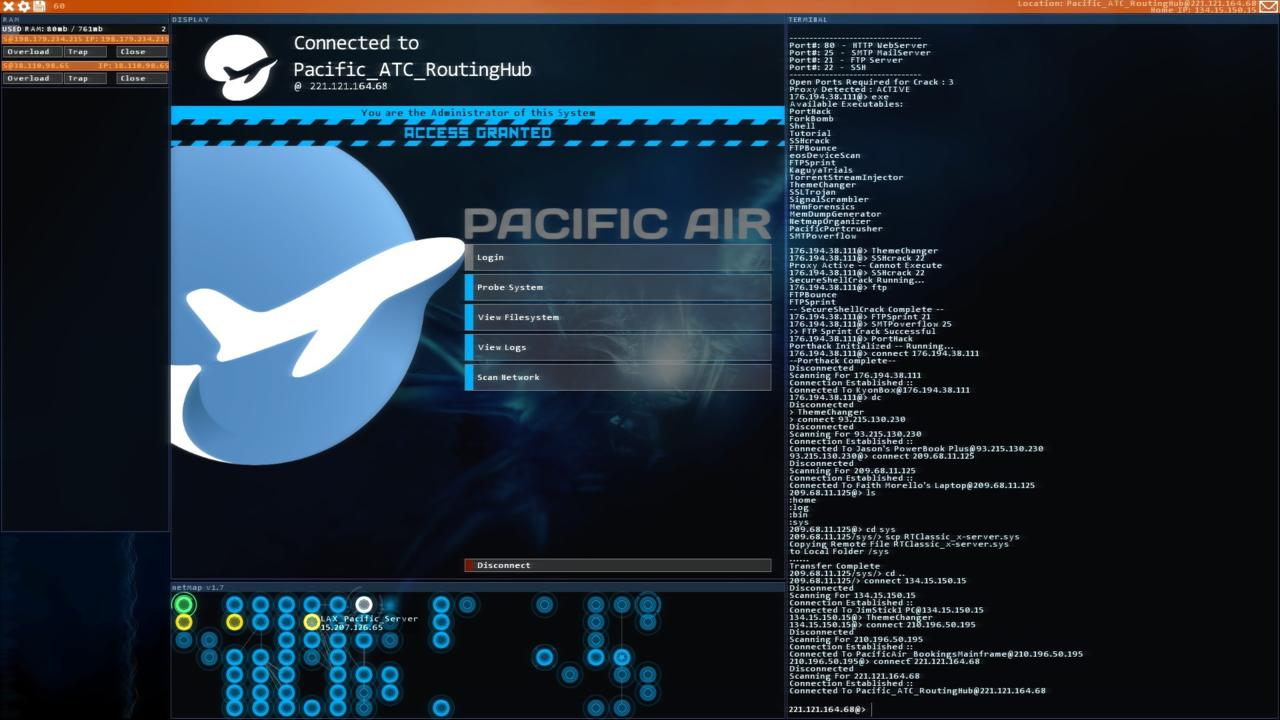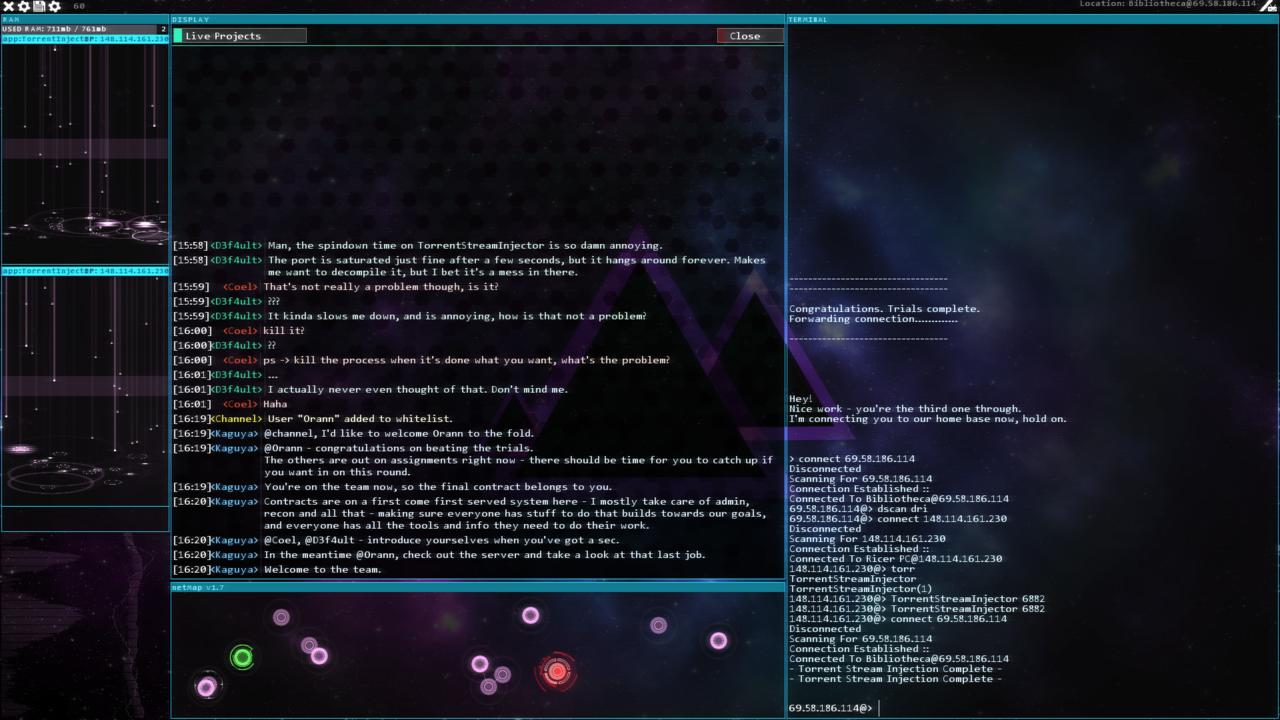Hacknet is a refreshingly grounded take on the hacker-sim genre. With a crude, Linux-inspired interface and dark, driving soundtrack, it follows the story of a recently deceased hacker named Bit, who reaches out to you from beyond the grave. What follows quickly becomes a hive of building tension and a satisfying deep-dive down the rabbit hole of online security and its moral effects on society.
Initially released in August 2015, Hacknet is now seeing its first expansion: Labyrinths. This entirely new chapter takes place alongside the main story and opens up soon after you've cleared the tutorials of the main game. In addition to granting you new hacking tools and techniques, it provides even more challenging investigations that require some serious attention to detail.
Missions in both Hacknet and Labyrinths range from straight-forward break, enter, and delete jobs to thorough investigations that involve finding vulnerabilities in order to crack into secure networks with numerous, heavily-encrypted servers. You’ll read files you shouldn’t be reading, steal confidential software, rummage through memory dumps for valuable information, and counter incoming hacker attacks amongst myriad other activities. Labyrinths is far tougher than the main campaign in this regard, though, since it doesn't waste any time throwing you into the deep end and relies on experience with previous puzzles.
Hacknet’s reliance on typing to navigate means you’ll want to break out a real-life notepad or smartphone camera to keep track of the commands available to you. Almost all the puzzles involve breaking through network security to find a specific piece of information, which means first cracking that system’s ports by using various executables from the command-line to grant you administrator access. Once in, you are free to browse, move, rename, delete or copy files, as well as scan for other linked systems on the network.
The challenge is that on top of taking up valuable time, these executables also take up a chunk of system memory while they’re running, so identifying the most economical order to run them is key to hacking efficiently. It doesn’t take long for hostile tracers to start pushing back on your progress, and they'll make your life difficult unless you learn how to get in and get out quickly. You may even find yourself in dire situations where your UI is deleted.

While the act of hacking in Hacknet is wonderfully exciting in itself, frequently recurring variables in the core puzzles means that after several hours of nefarious online activity, much of the process becomes routine. At worst, it feels like a missed opportunity to subvert the somewhat processional nature of the moment-to-moment in the later hours of the main story. This is not a problem in the Labyrinths campaign though, which grants that extra bit of variety to each hack.
In Hacknet’s main storyline, you get involved with a group named Entropy--affiliates of the recently deceased Bit--and work together to uncover the mystery surrounding his death. Labyrinths branches off this, pulling you away from the group to focus on a different, secret task with a different collective of hackers before returning to complete the original job. Labyrinths can be started at any point during the main campaign, though how much you enjoy it will largely depend on how deep your understanding of hacking in Hacknet is.
Hacknet’s narrative explores and captures the dark side of the Internet while also knowing when to keep it light-hearted. You stumble upon random IRC logs that vary from typical troll-level banter to arguments about the depravity of society. You’ll dig incessantly at various corporate interests all while uncovering the mystery of your colleague’s death. As the stakes get higher and the stories start to intertwine, the feeling that you’re doing things you really shouldn't be starts to hit home, creating a wonderful sense of tension around your actions that remains a constant throughout.

Where Hacknet relies on personal emails to move the story forward, Labyrinths tries to introduce the concept of team hacking with IRC (Internet Relay Chat). Replacing emails with a chat log that updates regularly with chatter from your fellow hackers during missions, the faster back-and-forth conversation effortlessly flows from mission critical information to jokes. That said, it’s disappointing that you can’t talk back to these characters, because you’ll want to feel more involved in the group and contribute firsthand to their discussions.
Labyrinths also slightly falters towards its end, where the stakes suddenly take a huge and unexpected leap. Although twists and surprises are central to Hacknet's main campaign narrative--counter-hackers and tracing programs are everywhere--Labyrinths’ felt more jarring than most. The frenzied urgency that’s whipped up in the campaign’s climax is gone just as quickly as it starts, leaving you feeling largely unaffected by its outcome.
The feeling of playing Hacknet in a dark room with headphones on and being absorbed by its engrossing puzzles and soundtrack--full of heavy beats and filthy synth sounds--feels as close as you can get to the Hollywood hacker experience. The puzzles are uniquely challenging without feeling inaccessible, and the Labyrinths expansion takes the formula further by integrating deeper investigations and adding more puzzle variety. Despite the stumbling climax and steady learning curve, Hacknet - Labyrinths is one hell of a ride that leads you down the rabbit hole and back again.













